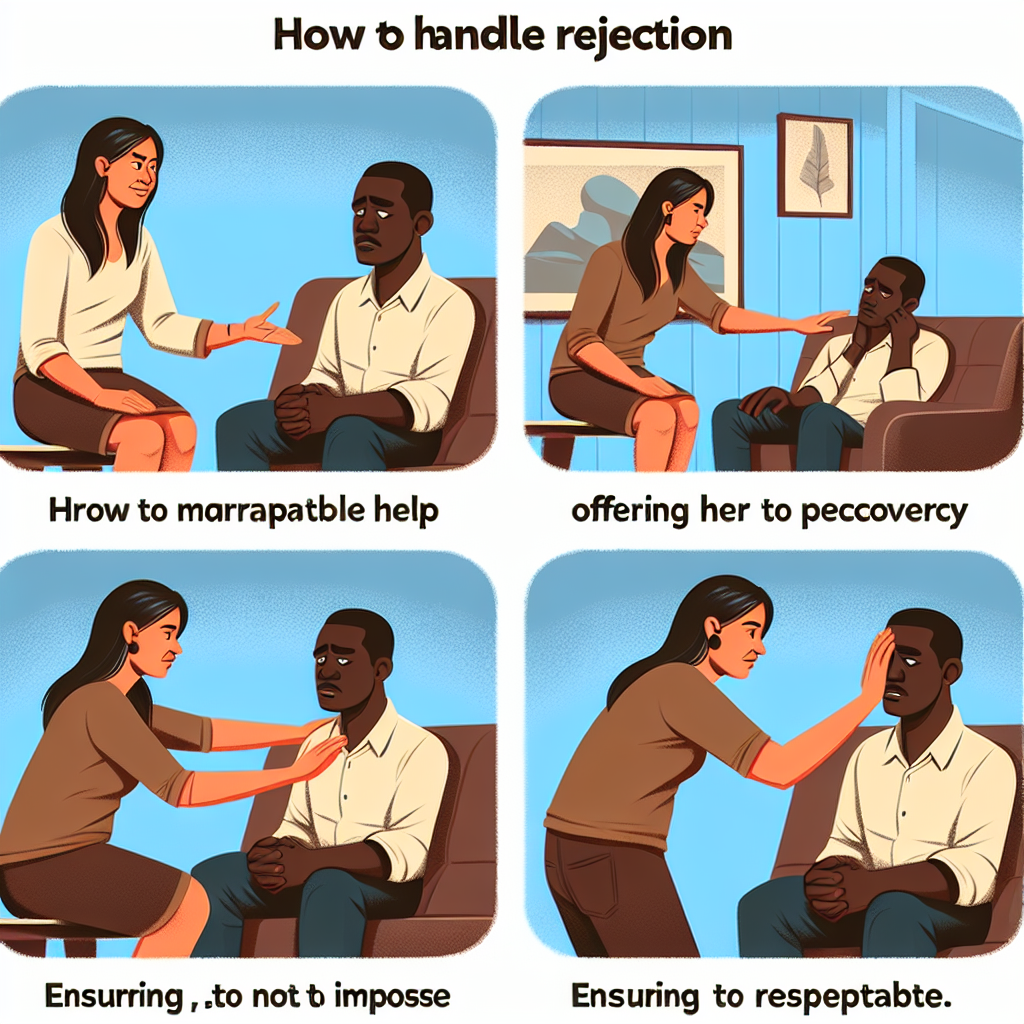-
Table of Contents

“Respect Their Journey: Embrace Patience and Understanding in the Face of Rejection.”
Introduction
Handling rejection when offering help to someone in recovery requires sensitivity, understanding, and resilience. It’s important to recognize that individuals in recovery may have complex emotions and personal boundaries that influence their responses. Rejection should not be taken personally; instead, it should be viewed as an opportunity to respect their autonomy and support their journey in a way that aligns with their needs. By maintaining a compassionate and non-judgmental attitude, you can create a safe space for them to seek help when they are ready. This approach not only preserves the relationship but also reinforces the individual’s sense of control and empowerment in their recovery process.
Strategies for Coping with Rejection When Offering Support to Someone in Recovery
Offering support to someone in recovery is a noble and compassionate act, but it can sometimes be met with rejection. This can be disheartening, especially when your intentions are pure and your desire to help is strong. However, understanding how to handle such rejection is crucial for maintaining your own well-being and continuing to be a source of support in the future.
First and foremost, it is essential to recognize that rejection is not a reflection of your worth or the value of your offer. People in recovery are navigating a complex and often tumultuous journey. Their rejection of your help may stem from a variety of reasons, including feelings of shame, a desire for independence, or simply not being ready to accept assistance. By acknowledging that their response is more about their current state than about you, you can begin to depersonalize the rejection and maintain a healthy perspective.
Moreover, it is important to practice empathy and patience. Recovery is a deeply personal process, and each individual’s path is unique. While you may feel that your support could make a significant difference, the person in recovery might need time to come to terms with their situation and decide when and how they want to accept help. By showing empathy, you demonstrate that you respect their autonomy and are willing to support them on their terms. This can build trust and potentially open the door for future opportunities to assist.
In addition, maintaining open and non-judgmental communication is key. When someone rejects your offer of help, it can be beneficial to express that you understand and respect their decision. Let them know that your offer stands and that you are available whenever they feel ready. This approach not only reinforces your commitment to their well-being but also leaves the door open for future interactions. It is crucial to avoid pressuring them or making them feel guilty for not accepting your help, as this can create additional barriers to their recovery.
Another strategy for coping with rejection is to seek support for yourself. Offering help to someone in recovery can be emotionally taxing, and facing rejection can amplify these feelings. Talking to a trusted friend, family member, or therapist about your experiences can provide you with the emotional support you need. They can offer a different perspective, help you process your feelings, and remind you of the positive impact you are making, even if it is not immediately visible.
Furthermore, it is beneficial to focus on self-care. Engaging in activities that bring you joy and relaxation can help you manage the emotional toll of rejection. Whether it is through exercise, hobbies, or mindfulness practices, taking care of your own mental and emotional health ensures that you remain resilient and capable of offering support in the future.
Lastly, it is important to educate yourself about the recovery process. Understanding the challenges and stages of recovery can provide you with valuable insights into why someone might reject help and how best to approach them in the future. This knowledge can empower you to offer more effective support and to be more patient and understanding when faced with rejection.
In conclusion, handling rejection when offering help to someone in recovery requires a combination of empathy, patience, open communication, self-care, and education. By adopting these strategies, you can maintain your own well-being while continuing to be a compassionate and supportive presence in the lives of those navigating the path to recovery. Remember, your willingness to help is a powerful testament to your character, and even if it is not always accepted, it is always valuable.
Building Resilience: Handling Rejection While Assisting a Loved One in Recovery
Rejection can be a tough pill to swallow, especially when it comes from someone you care about deeply. When offering help to a loved one in recovery, the sting of rejection can feel particularly sharp. However, understanding how to handle this rejection with grace and resilience is crucial for both your well-being and the well-being of the person you are trying to support.
First and foremost, it is essential to recognize that rejection is not a reflection of your worth or the value of your support. People in recovery often face a myriad of emotions and challenges, and their rejection of help may stem from a place of vulnerability, fear, or a desire for independence. By acknowledging that their refusal is not a personal affront, you can maintain a compassionate perspective and avoid internalizing their response.
Moreover, it is important to practice patience and empathy. Recovery is a complex and non-linear journey, and your loved one may need time to come to terms with their situation and the support they require. During this period, it is vital to remain a steady and understanding presence. Offering a listening ear without judgment can create a safe space for them to express their feelings and concerns. This approach not only fosters trust but also demonstrates your unwavering commitment to their well-being.
In addition to patience, setting healthy boundaries is crucial. While it is natural to want to be there for your loved one at all times, it is equally important to take care of your own mental and emotional health. Establishing boundaries ensures that you do not become overwhelmed or burnt out, which can ultimately hinder your ability to provide effective support. Communicate openly with your loved one about your limits and encourage them to seek additional resources, such as support groups or professional counseling, to supplement the help you offer.
Furthermore, educating yourself about the recovery process can enhance your ability to provide meaningful support. By gaining a deeper understanding of the challenges and triumphs associated with recovery, you can approach your loved one with greater empathy and insight. This knowledge can also help you identify the most appropriate ways to offer assistance, whether it be through practical help, emotional support, or simply being present.
It is also beneficial to focus on the small victories and progress made along the way. Recovery is often marked by incremental steps forward, and celebrating these achievements can provide both you and your loved one with a sense of hope and motivation. Acknowledging their efforts, no matter how small, reinforces the idea that progress is possible and that they are not alone in their journey.
Lastly, it is important to remain adaptable and open to change. The needs and circumstances of someone in recovery can evolve over time, and your approach to offering help may need to adjust accordingly. By staying flexible and responsive, you can continue to provide relevant and effective support, even in the face of rejection.
In conclusion, handling rejection when offering help to someone in recovery requires a blend of patience, empathy, and resilience. By maintaining a compassionate perspective, setting healthy boundaries, educating yourself, celebrating progress, and remaining adaptable, you can navigate the challenges of rejection with grace and continue to be a source of strength and support for your loved one. Remember, your unwavering presence and understanding can make a significant difference in their recovery journey, even if it is not always immediately apparent.
Q&A
1. **Question:** What is a healthy way to respond if someone in recovery rejects your offer of help?
**Answer:** Respect their decision and give them space, while letting them know you are available if they change their mind.
2. **Question:** How can you maintain a supportive relationship after your help is rejected?
**Answer:** Continue to show empathy and understanding, and engage in regular, non-intrusive check-ins to show you care without pressuring them.
Conclusion
Handling rejection when offering help to someone in recovery involves respecting their autonomy, maintaining a supportive presence, and avoiding taking the rejection personally. It’s important to understand that recovery is a personal journey and individuals may need to navigate it in their own way. Offering continued, non-intrusive support and being available when they are ready to accept help can foster trust and demonstrate genuine care. Practicing patience and empathy, while also taking care of your own emotional well-being, ensures that you remain a positive influence in their recovery process.



